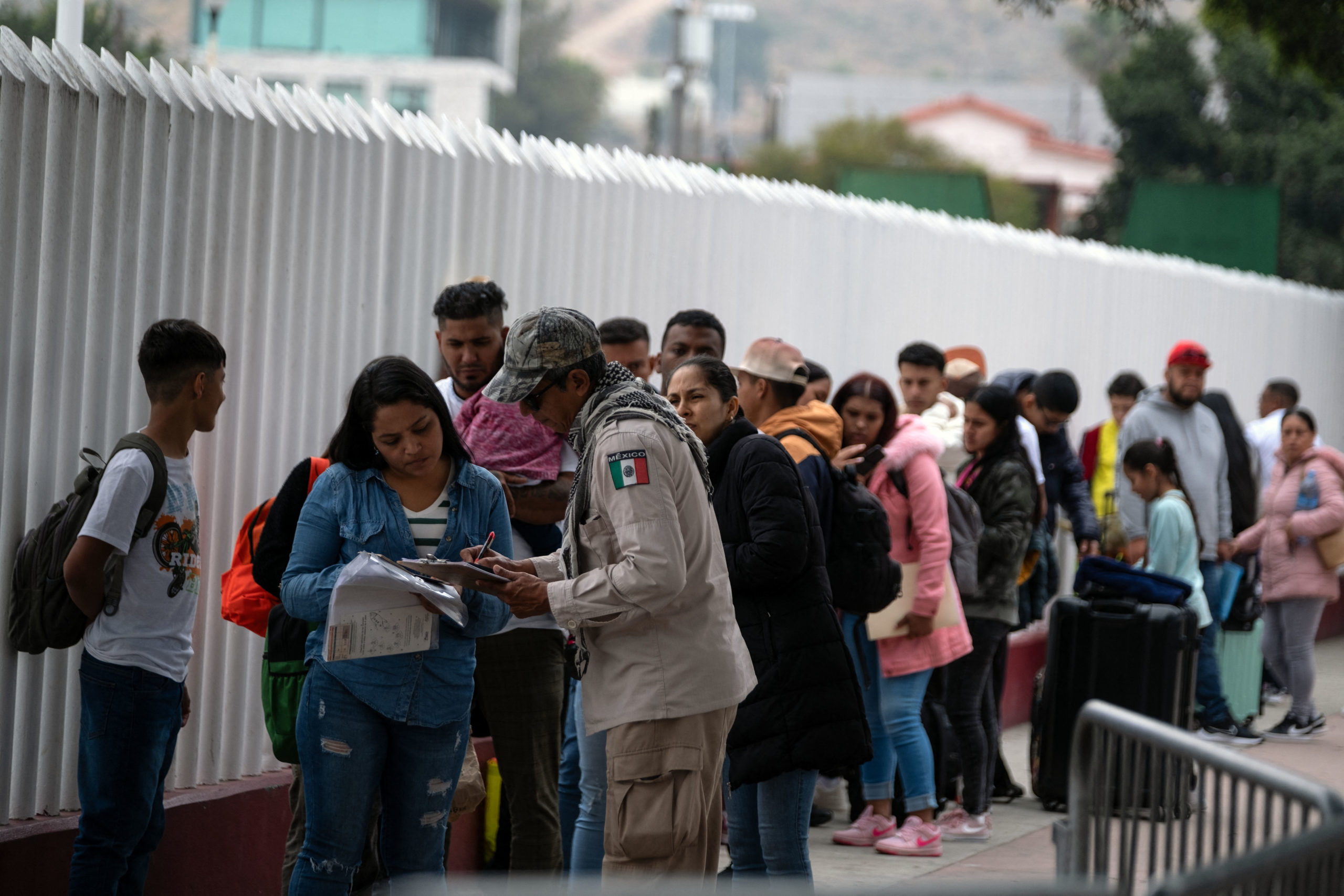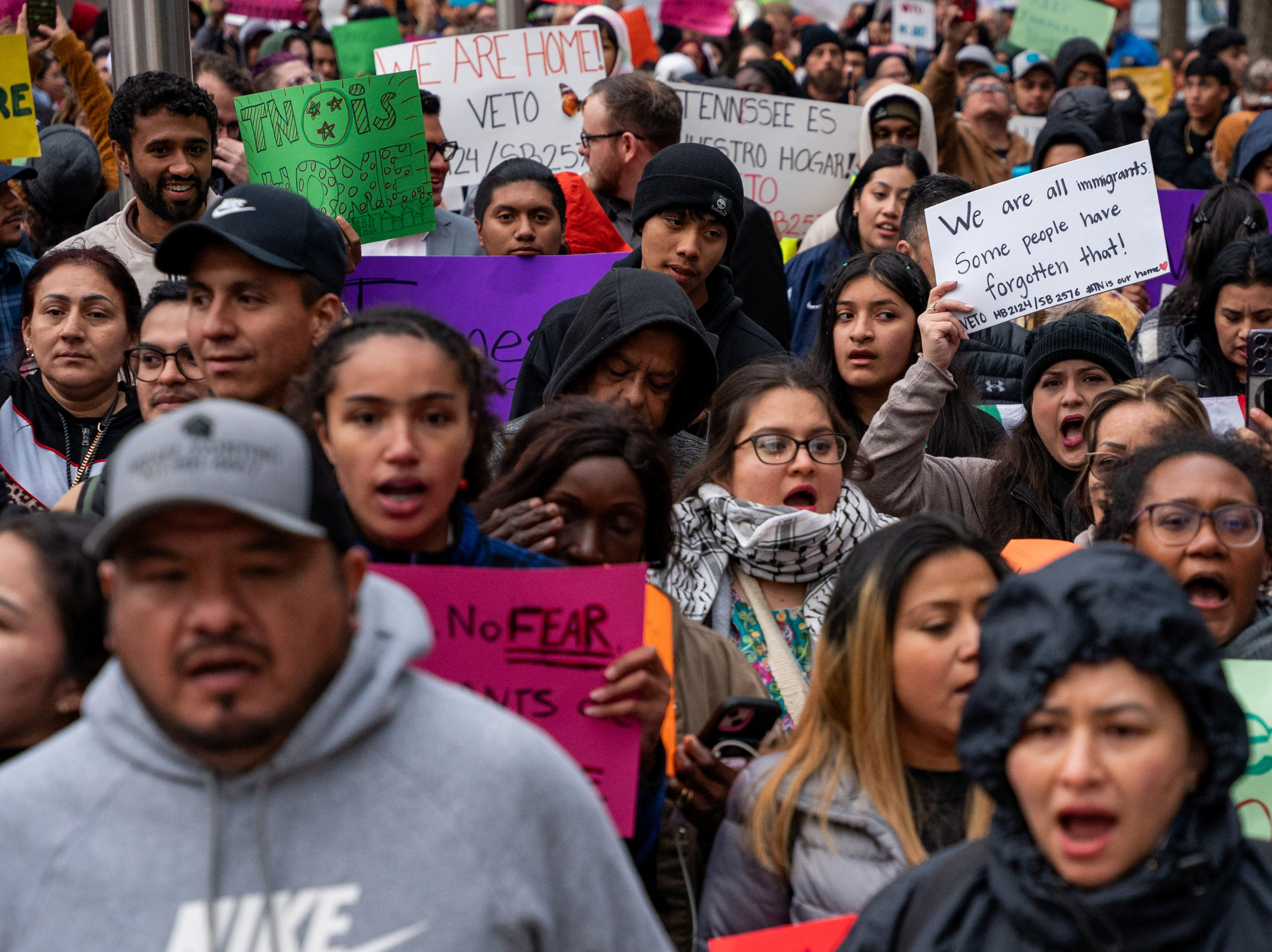President Joe Biden on Tuesday announced a new effort to provide a path to citizenship to hundreds of thousands of immigrants in the U.S. illegally who are married to U.S. citizens, an election-year move that contrasts sharply with Republican rival Donald Trump's plan for mass deportations.

MIXED POLLS
LIVING IN FEAR
Speaking Tuesday at a White House event commemorating the 12th anniversary of the Deferred Action for Childhood Arrivals (DACA) policy, Biden unveiled his own executive order laying out a plan to give deportation protection, work permits, and a pathway to legal status to hundreds of thousands of illegal immigrant spouses. Those eligible must have lived in the U.S. for at least 10 years, be legally married to a U.S. citizen, and be ultimately approved by the Department of Homeland Security (DHS).
The illegal immigrants approved under the order will have three years to apply for permanent residency, allowing them to remain in the U.S. and gain work authorization.
But like DACA, the action is set to face legal challenges from conservative groups and immigration hawks, who say the executive order is unconstitutional and inappropriately interprets its underlying statute.
An attorney for the Immigration Reform Law Institute told the Daily Caller News Foundation that they are currently identifying legal challenges, and America First Legal – a conservative legal organization headed by former Trump adviser Stephen Miller – on Tuesday pledged legal action against the order.
“This is nothing but an attempt to create an amnesty by abuse of the parole authority,” Matt O’Brien, director of investigations for the Immigration Reform Law Institute (IRLI) and a former immigration judge, told the DCNF.
The maneuver the Biden administration is using to grant this mass amnesty is an authority known as “parole-in-place.” The president will use parole-in-place to remove obstacles in U.S. law that prevent noncitizen spouses who entered the country illegally from obtaining green cards without leaving the country, offering them a pathway to permanent legal status.
Under current law, an illegal immigrant can apply for legal status after they have married a U.S. citizen, but they are required to leave the country to move forward with the process. Under Biden’s expansion of parole-in-place, those noncitizens will be allowed to wait out the application process while remaining in the country.

However, many immigration hawks say this move is blatantly unconstitutional. The order, they say, usurps congressional authority by using a maneuver that is intended to be extremely limited in scope and applying it to a massive group of individuals.
While immigration law gives the executive branch discretion to grant parole on a case-by-case basis, experts say the Biden administration is abusing the law by granting mass parole to over half a million people.
“Parole is intended to be very narrow, allowing inadmissible aliens to enter on a temporary and case-by-case basis only,” Joey Chester, communications manager for the Federation for American Immigration Reform, said in a statement to the DCNF, stressing that the “politically motivated” order is a violation of immigration law.
“Parole-in-place has no basis in law and rewards those who broke U.S. immigration law. These illegal aliens will get work permits, green cards, and a path to citizenship – sending a message around the world that if you cross our borders illegally and stay here long enough, you will eventually get amnesty,” Chester continued.
Chester was not the only critic to argue that the order would incentivize more illegal immigration.
“Rather than stopping the worst border crisis in history, President Biden has overreached his executive authority to use an unconstitutional process, circumventing voters and their elected representatives in Congress, to send a message that amnesty is available to those who enter illegally into the United States,” James Massa, CEO of NumbersUSA, said in a statement.
“The action is unconstitutional. The timing is unconscionable,” Massa added.
Parole-in-place began in the Reagan administration when Congress amended the Immigration and Nationality Acts (INA) to allow paroled noncitizens living in the U.S. legally to apply for green cards, O’Brien told the DCNF. However, federal immigration authorities under the Clinton administration concluded it could also grant parole to illegal immigrants.

“Neither advance parole (allowing aliens with no status to re-enter the US after travel) nor parole-in-place have any basis in statute,” O’Brien said to the DCNF. “The INA requires, with limited exceptions, anyone who seeks a green card to enter the U.S. lawfully and maintain lawful status until a green card is granted.”
Biden on Tuesday also announced he will be speeding up work visas for DACA recipients and other “Dreamers” who have earned a degree from a U.S. institution and received a job offer from a U.S. employer in a field related to their degree.
The mass amnesty plan comes two weeks after Biden’s executive order ostensibly cracking down on illegal immigration at the U.S.-Mexico border. That order – which was panned by both immigration hawks and advocates alike – temporarily suspends the illegal entry of noncitizens across the southern border once the number of average border encounters exceeds 2,500 a day over a week-long period.
Biden faces a close re-election battle with former President Donald Trump, as well as incredibly low approval ratings on his handling of the immigration crisis. The U.S. has seen over 7 million illegal crossings along the southern border during his time in office, according to the latest Customs and Border Protection data.
The current border crisis ignited after Biden, following through on campaign promises, immediately embarked on an agenda to erase Trump’s immigration legacy when he took office in 2021.
In the first year of his presidency, Biden took 296 executive actions on immigration, according to an analysis by the Migration Policy Institute. Of these executive actions, 89 specifically reversed or began the process of undoing policies undertaken by the Trump administration.
Biden has since undone major initiatives launched by his predecessor, such as ending border wall construction, shuttering the Remain in Mexico program, and ending the COVID-era Title 42 health order that quickly expelled migrants.
The White House did not immediately respond to a request for comment from the DCNF.
The post-pandemic years have been a perplexing time in immigration politics. Border crossings spiked after an early pandemic-era lull in 2020. That increase coincided with the first year of a new Democratic president, who sought to be more welcoming to immigrants after campaigning against Donald Trump’s harshness. And somewhere along the way, the public’s opinion of immigration, both legal and not, began to sour.
That’s the context behind President Joe Biden’s shifts to the center on the subject this spring and summer, particularly when he announced new restrictions that make life more difficult for asylum seekers.
But now, Biden seems to be swinging in the opposite direction: outlining a plan to offer legal protections to the undocumented spouses of American citizens — a win for immigrants, and the political left.
The plan responds to longstanding demands made by pro-immigrant activists, tamping down some of the progressive and left-flank criticism he’s gotten for that rightward pivot on immigration he and other Democrats have felt like they have to take.
The move is both a balancing act of politics and a test case for policy: Is there a limited, humanitarian reform that can unite progressive and moderate Democrats, win support from a hesitant public, and provide political cover for Biden if he has to keep moving to the center on immigration more broadly?
The new policy tries to appease Biden’s liberal and progressive critics
Using something called a “parole-in-place” program, the new policy would allow the noncitizen spouses and stepchildren of American citizens to apply for permanent residency and work permits (known as green cards). As my colleague Nicole Narea explains, the policy would allow these applicants to remain in the US during that time, instead of having to leave the country for 10 years as existing rules require. Permanent residency would then offer a pathway to citizenship. The plan stands to affect about half a million immigrants living in the US without legal status.
That’s true even when one looks at some of the plan’s fine print.
For example, spouses must have been living in the US for at least a decade and have been married to a US citizen as of June 17, before the announcement was made. They must also “not pose a threat to public safety.”
The announcement was timed to align with a White House commemoration of the launch of President Barack Obama’s Deferred Action for Childhood Arrivals (DACA) initiative 12 years ago. DACA, a directive, and program that extended protections from deportation to young undocumented immigrants brought to the US as children, has faced over a decade of Supreme Court challenges and lawsuits but survived so far — though activist groups have long sought for those protections to be codified into law.
Those efforts have lost steam since the start of the Trump and Biden eras, but many of these groups have welcomed this policy announcement as a much-needed victory given the rightward shift of the public and both political parties.
“We recognize this moment as a victory for our movement, a step in the right direction for President Biden and a recommitment to continue to fight for the day where ALL people have the dignity and freedom to stay and freedom to thrive,” Greisa Martinez Rosas, the executive director of the pro-immigrant United We Dream, said in a statement released with commendations from an array of other national and local activist groups.
Similarly, many of the congressional Democrats who criticized Biden for his recent moves to curtail the right to asylum and enforce border controls more strongly are also commending the president.
It’s also an example of how Biden is performing a tenuous balancing act
The announcement is also a reflection of the times we’re living in: Immigration politics have become deeply toxic for Democrats. Republicans have seized on the issue since Biden’s presidency began, constituents have called for more moderate policy in battleground districts and border communities, and the general attitude toward immigration has become much more negative.
Biden was responding to those political realities when he announced the reform of the asylum system in June, which gave border officials the ability to shut down the processing of asylum requests when daily border crossing numbers reached 2,500.
Those realities also likely drove his decision to barter with congressional Republicans over an immigration and border bill this winter, which would have given him authority to shut down the southern border and ramp up enforcement.
That bill, specifically, went nowhere after Trump intervened to persuade House Republicans against supporting it. Trump wanted to deny Biden a legislative victory, and — in a demonstration of how the politics of this issue divide Democrats and unite Republicans — wanted to keep the issue in play during the 2024 election.
The public is also waffling. Plenty of issue polling shows independents and various kinds of moderate voters are still concerned about immigration levels. Plenty of voters trust Trump over Biden on immigration, or are shifting that way, including Latino voters. And more voters are becoming open to more hardline immigration policies, like building a border wall, restricting asylum, or deputizing the National Guard to round up undocumented immigrants who pose public safety risks.
Biden’s policy announcement responds to these dynamics: He can continue to enforce tougher asylum rules and be more aggressive about the southern border, responding to the demands of a public who wants the country and its leaders to be more restrictive on immigration.
It also responds to demands from parts of his base — progressives, the more left-leaning members of his party in the House and Senate — and gives influential activist groups and organizers something substantive to pitch to progressive-minded voters.
And the combination of policy announcements reflects the idiosyncratic opinions many Americans have on immigration policy, like generally being more open to those immigrants who have lived here for a while and still being positive about immigrants as individuals, while still having the perception that undocumented immigrants are threats to public safety and public order, or being wary about their impact on the economy (which, to be sure, is generally positive).
But the combination of moves seems aimed to shore up support within his party, to satiate the concerns of those swing voters wary about immigration, and to stump Republicans. At the same time, there’s also a chance that these policy announcements end up causing the opposite effect: of moderate, independent, and swing voters seeing this as another soft-on-the-border policy from a president beholden to his left flank, and where progressives and left-leaning voters still see his other border policies as being too cruel.



